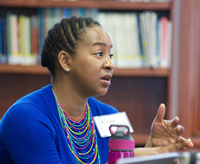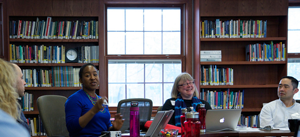
Ferguson on the First Day?
I am organized.
I have to-do lists, stop-doing lists, someday lists, and checklists galore. When it’s time to prep for the semester, I pull up my teaching Excel spreadsheet and get to work. Order books. Revise syllabus. Set up BlackBoard. And request to be assigned to my favorite sunny classroom.
I had my lecture ready for the first day of my Introduction to Old Testament/Hebrew Bible class. It is a combination of welcome, syllabus review, and class overview while channeling Lou Gossett, Jr. in An Officer and a Gentleman.
But when the news broke regarding Ferguson, I had to reconsider.
On August 9th in Ferguson, Missouri, a White police officer, Darren Wilson, shot and killed an unarmed Black man, 18-year-old Michael Brown. As the news went viral, many of my academic colleagues on social media offered their thoughts and feelings about yet another instance of police brutality against African Americans. Marcia Chatelain began tweeting teaching resources with the hashtag #FergusonSyllabus (link: https://twitter.com/hashtag/FergusonSyllabus), and some colleagues expressed their intention to discuss issues related to Ferguson on the first day of class.
Yet, I noted that my non-Black colleagues tended to not say much if anything about Ferguson. Of course, I follow only a limited number of academics on social media, and I am generalizing based on my own curated networks. Still, I asked others to point me to blog posts and articles, and I heard crickets. Odyssey Network’s “On Scripture” offered preaching reflections (link: No Longer Available) several days after the initial incident. Later, G. Brooke Lester tweeted his post for the “white, patched-elbow, #sbl academic” (link: https://twitter.com/AnummaBrooke/status/502455625486700545).
I wondered if some academics regarded Ferguson as a “Black” issue and they were afraid to address issues of race. Or perhaps they regarded the events in Ferguson as unrelated to their academic fields and unconnected to their course material.
So I had to ask myself: Should I discuss Ferguson in class? On the first day of class? I could certainly see connections that I could make with Ferguson: issues of power and privilege, the treatment of the oppressed, cities of refuge…but these were connections that I could make given my knowledge of biblical texts.
After serious consideration, I chose not to address Ferguson in my class primarily because I try to teach my students to resist the too-easy attempts to read biblical texts in light of contemporary events. Many of my first-year M.Div. students are used to asking “How does this preach?” or “How does this apply to me?” I help them to learn more about the literary and historical contexts of biblical texts and the great cultural gap between ancient societies and our lives in 2014. I wanted to begin the semester by setting the foundation for the new approaches that they would discover in class. Discussing Ferguson would have taken us too far afield on the first day.
As well, I teach biblical studies at Howard University School of Divinity, and the Ferguson incident has received significant attention on campus. A picture of Howard students with their hands up in support of Mike Brown went viral (link: https://twitter.com/The_Blackness48/status/499714499688300545), and Howard alumna Mya Aaten-White was shot during Ferguson protests (link: http://www.nbcwashington.com/news/local/Howard-University-Grad-Mya-White-Shot-in-Ferguson-Missouri-271285081.html). Several official and unofficial events were taking place on campus in support of Mike Brown and Ferguson.So I felt that it was more important to offer a space that was a Ferguson-free zone.
So I’m wondering, did YOU discuss Ferguson on your first day of class? Why or why not?

I included Brian Bantum’s piece on Ferguson in the first week of a new Scripture class we are introducing with our new curriculum. To me, there are core questions about bodies and identity that the Bible confronts over and over again in ways too often downplayed in Christian communities. I hoped to start the semester by addressing these questions head-on.
I wrestled with this question, too, as I prepared my own Intro to the OT syllabus for a predominantly white class of students at a liberal arts college. And I chose not to discuss Ferguson on the first day for some of the same reasons you did. I’m also trying to defamiliarize the Bible for them and show how complicated the process of interpretation is, especially the process of making sense of the biblical texts in our (post)modern contexts. That said, the class also tries to explore this process by asking students to debate the role and meaning of the Bible in contemporary issues. The students chose the topics for debate and I’m hoping to direct their attention to matters of race and identity, violence and its legitimation and abuse, and oppression and protest that are raised by the events of Ferguson.
I haven’t blogged about it, yet, because I experienced Mike Brown’s murder and Ferguson through the prism of my time in Jerusalem this July — which I find extremely difficult to write about. Then I arrived back home just a few days before the term started, so that pivot was not smooth.
As for syllabi, the best place for Ferguson would be in a late unit in one of my courses, not first day. So I’m thinking about that, or about doing a public event in a talk series I’m organizing. Or both. (No, I’m not organized going into this term.)
Finally, I have always maintained certain boundaries between writing and academics. The only way in which I feel capable of responding to Ferguson is as a writer, not as a scholar. A writer whom nobody reads.
I started my Introductory class today, and I did not speak about Fergusson or Michael Brown, although I have reflected quite a bit on how “the Bible” has been used in events around Mr. Brown’s death – specifically, how funeral-service biblical interpretations continue to function as sites of contestation and protest about Black identity and Black life. How does one read the Bible after gunshots? I still need to get to know my students and let them know me before taking up the question of race/ethnicity. My syllabus does include a lecture on “The Hebrew Bible and Ethnicity/Race” (a broad topic, I can’t help myself) and I plan to address some of the pressing issues of power, violence and racial/ethnic identity.
I talked about Ferguson in World Religions today, though I don’t pretend to have done a great job with it. I passed out a short article on Al Sharpton’s recent visit and used it as an occasion to ask the questions: what role does/can religion play in a political event of this nature? We also talked about the importance of knowing one’s history in order to make sense of religious actions. I really didn’t have anything helpful to “tell” them about Ferguson, but I wanted to start them thinking about religion as something current and active. Perhaps I would have been wiser to leave it alone for the time being.
There has been no public discussion on my campus about Michael Brown’s death or the civic unrest in Ferguson that followed. I added to this silence by not referencing either Brown or Fergusion on the first day of class. Part of my decision to remain silent about Brown’s killing has to due with my own uneasiness with having to confront the reality head-on that Black dead bodies don’t warrant the attention of students who tend to populate my classrooms. A white female colleague reported her utter amazement at how few students in her class had even the sketchiest familiarity with the Brown and Ferguson case. Honestly, I don’t know if I could have kept myself together had I introduced the topic and discovered that the vast majority of students found it to be new news. My unsettled thoughts and feelings about this unfolding drama of race and lynching-style law enforcement sickens me. And that’s not a good – healthy -way for me to start my classes.
I’m not a professor, but I am a pastor. Sunday will be my first day back in the pulpit after summer vacation. I will address as part of a sermon: Be the Change.
Enjoy your work . . . look forward to more . . .
Rev. Alfie Wines, Ph.D. Pastor, Bible Scholar, Theologian
Thanks to everyone who has commented. I appreciate your taking the time to share your choices and your reasoning.